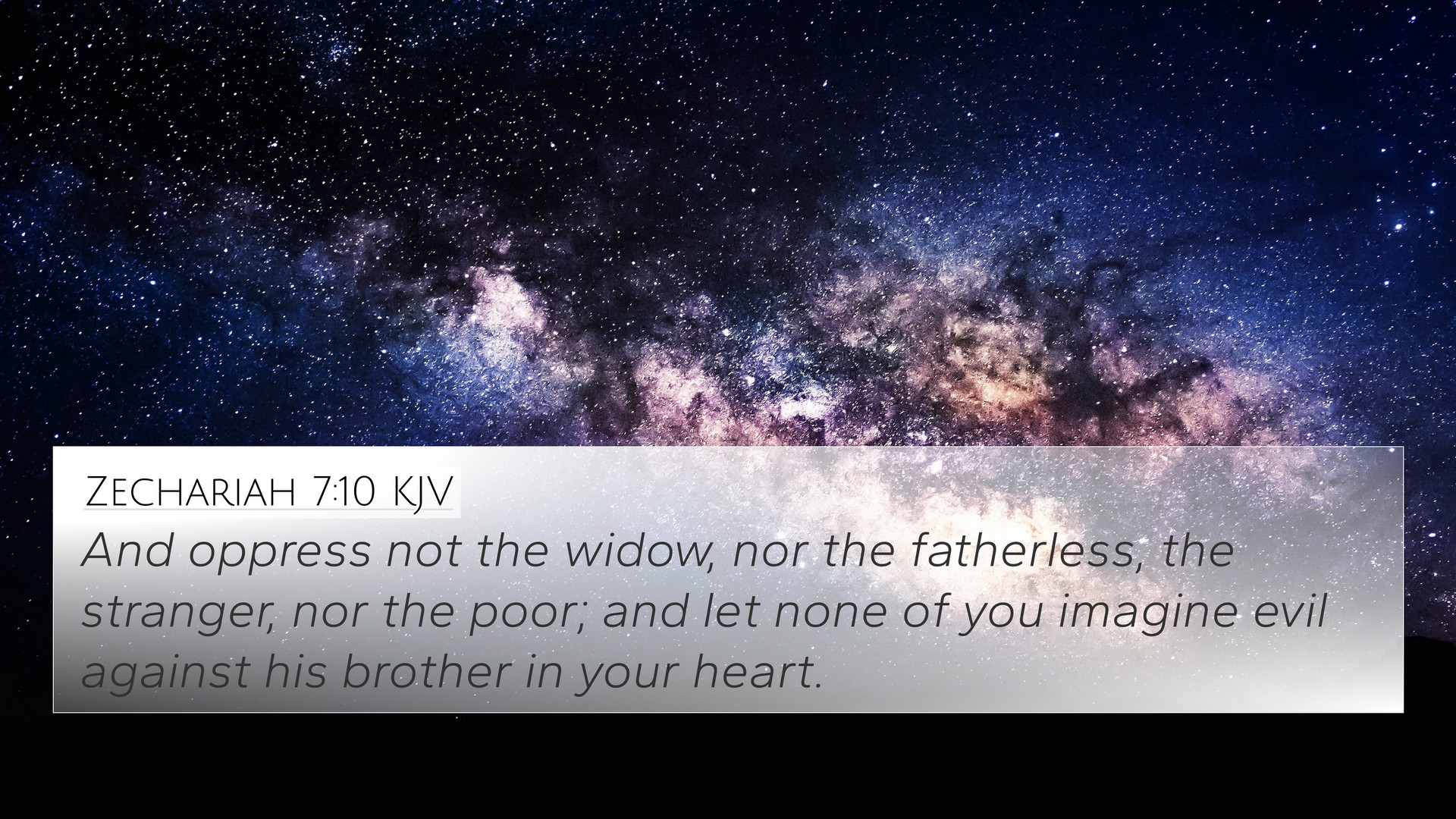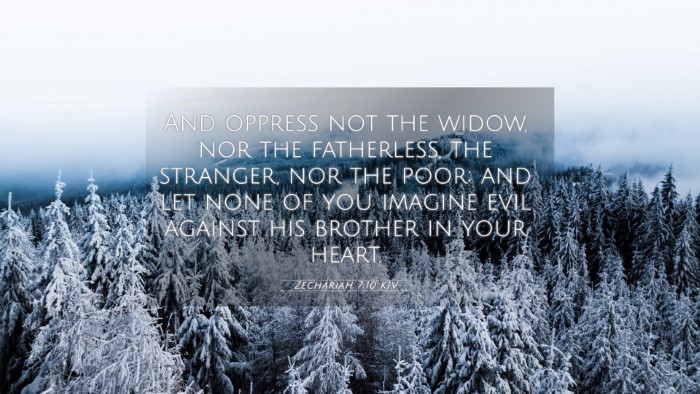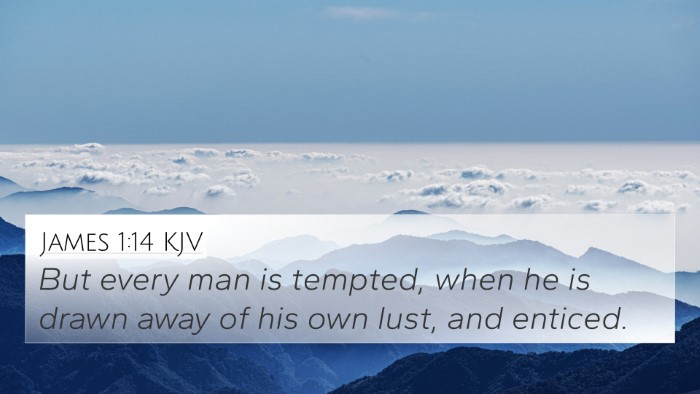Old Testament
Genesis Exodus Leviticus Numbers Deuteronomy Joshua Judges Ruth 1 Samuel 2 Samuel 1 Kings 2 Kings 1 Chronicles 2 Chronicles Ezra Nehemiah Esther Job Psalms Proverbs Ecclesiastes Song of Solomon Isaiah Jeremiah Lamentations Ezekiel Daniel Hosea Joel Amos Obadiah Jonah Micah Nahum Habakkuk Zephaniah Haggai Zechariah MalachiZechariah 7:10 Similar Verses
Zechariah 7:10 Cross References
And oppress not the widow, nor the fatherless, the stranger, nor the poor; and let none of you imagine evil against his brother in your heart.
Uncover the Rich Themes and Topics of This Bible Verse
Listed below are the Bible themes associated with Zechariah 7:10. We invite you to explore each theme to gain deeper insights into the Scriptures.
Zechariah 7:10 Cross Reference Verses
This section features a detailed cross-reference designed to enrich your understanding of the Scriptures. Below, you will find carefully selected verses that echo the themes and teachings related to Zechariah 7:10 KJV. Click on any image to explore detailed analyses of related Bible verses and uncover deeper theological insights.
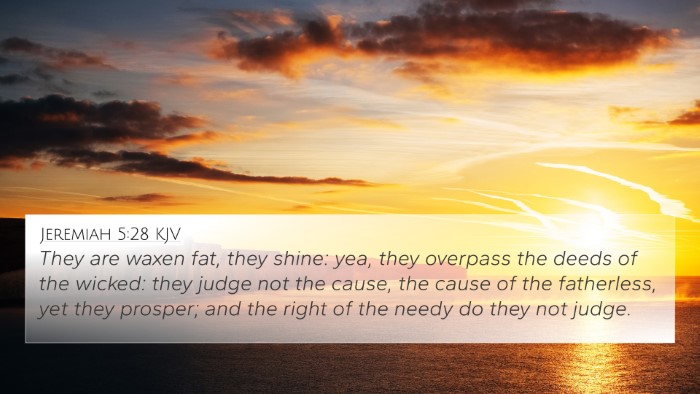
Jeremiah 5:28 (KJV) »
They are waxen fat, they shine: yea, they overpass the deeds of the wicked: they judge not the cause, the cause of the fatherless, yet they prosper; and the right of the needy do they not judge.
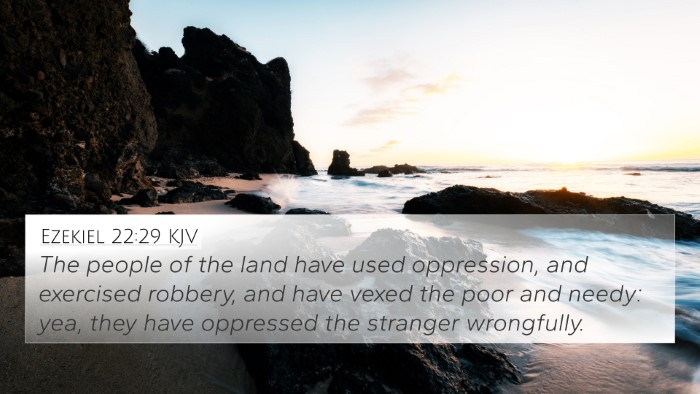
Ezekiel 22:29 (KJV) »
The people of the land have used oppression, and exercised robbery, and have vexed the poor and needy: yea, they have oppressed the stranger wrongfully.
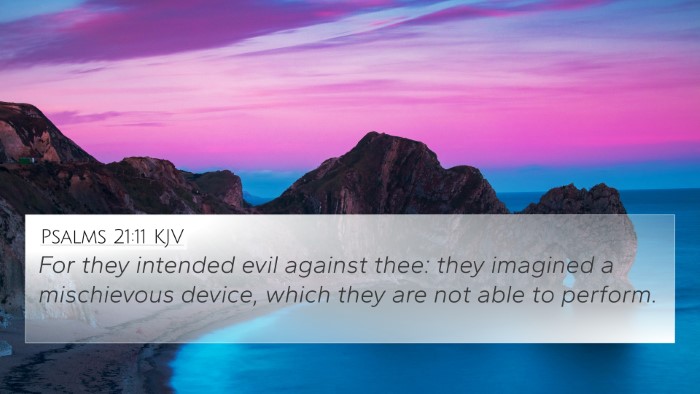
Psalms 21:11 (KJV) »
For they intended evil against thee: they imagined a mischievous device, which they are not able to perform.
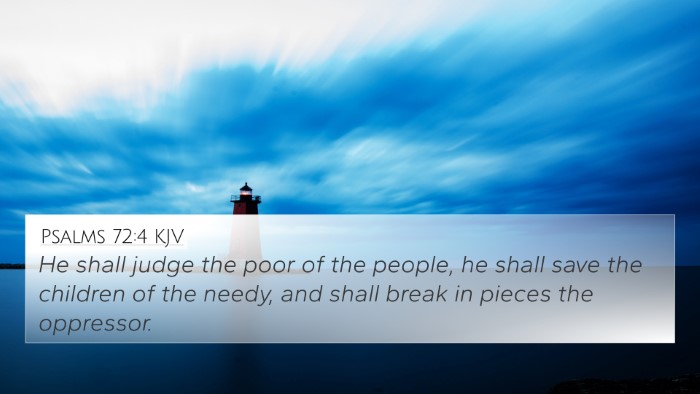
Psalms 72:4 (KJV) »
He shall judge the poor of the people, he shall save the children of the needy, and shall break in pieces the oppressor.
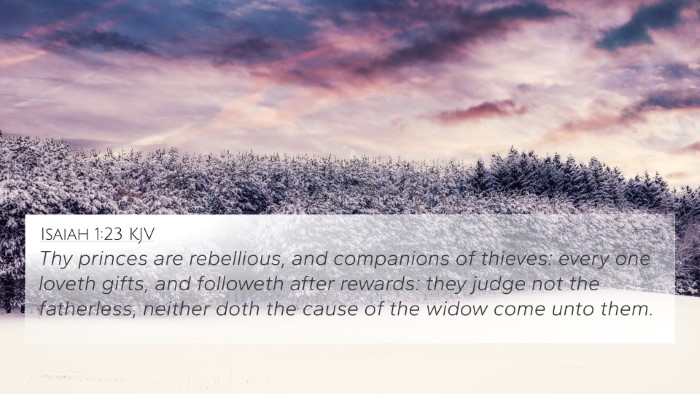
Isaiah 1:23 (KJV) »
Thy princes are rebellious, and companions of thieves: every one loveth gifts, and followeth after rewards: they judge not the fatherless, neither doth the cause of the widow come unto them.
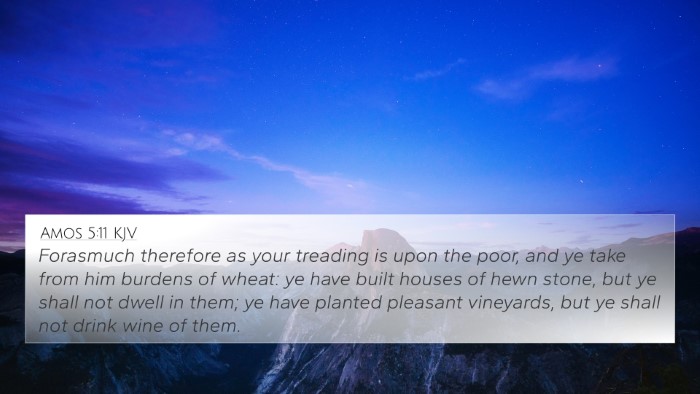
Amos 5:11 (KJV) »
Forasmuch therefore as your treading is upon the poor, and ye take from him burdens of wheat: ye have built houses of hewn stone, but ye shall not dwell in them; ye have planted pleasant vineyards, but ye shall not drink wine of them.
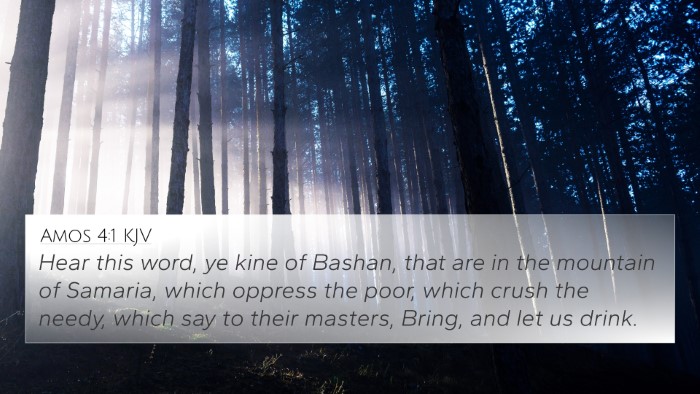
Amos 4:1 (KJV) »
Hear this word, ye kine of Bashan, that are in the mountain of Samaria, which oppress the poor, which crush the needy, which say to their masters, Bring, and let us drink.
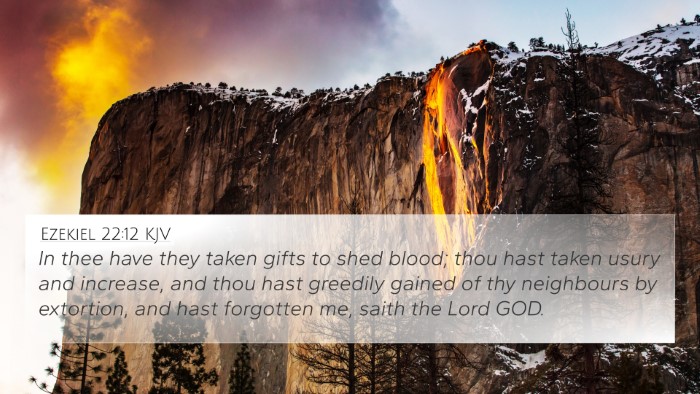
Ezekiel 22:12 (KJV) »
In thee have they taken gifts to shed blood; thou hast taken usury and increase, and thou hast greedily gained of thy neighbours by extortion, and hast forgotten me, saith the Lord GOD.
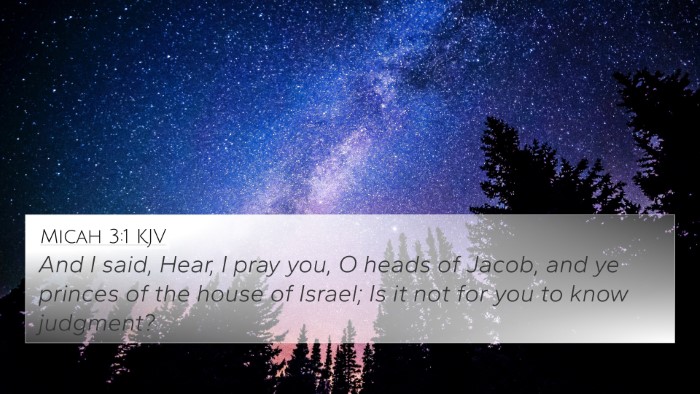
Micah 3:1 (KJV) »
And I said, Hear, I pray you, O heads of Jacob, and ye princes of the house of Israel; Is it not for you to know judgment?
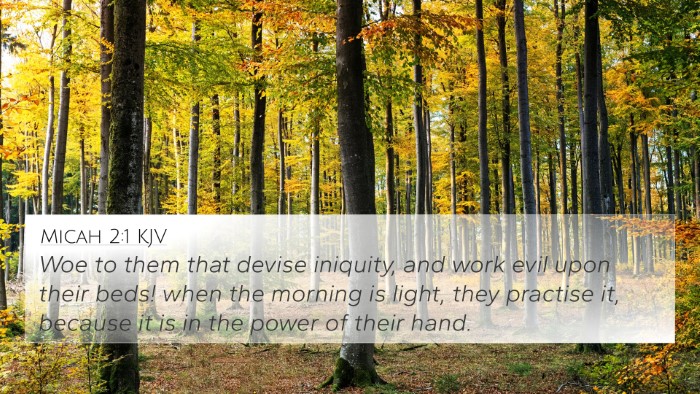
Micah 2:1 (KJV) »
Woe to them that devise iniquity, and work evil upon their beds! when the morning is light, they practise it, because it is in the power of their hand.
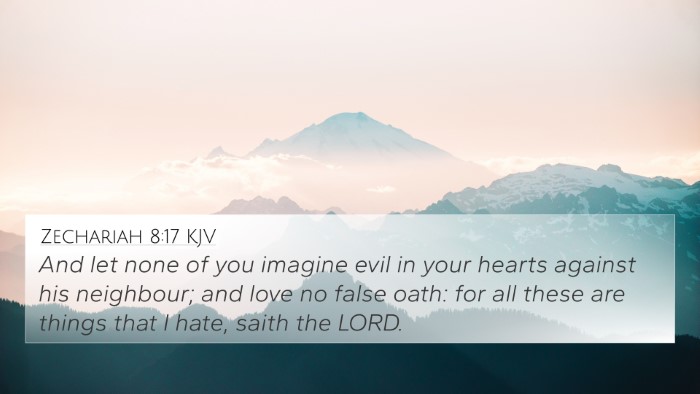
Zechariah 8:17 (KJV) »
And let none of you imagine evil in your hearts against his neighbour; and love no false oath: for all these are things that I hate, saith the LORD.
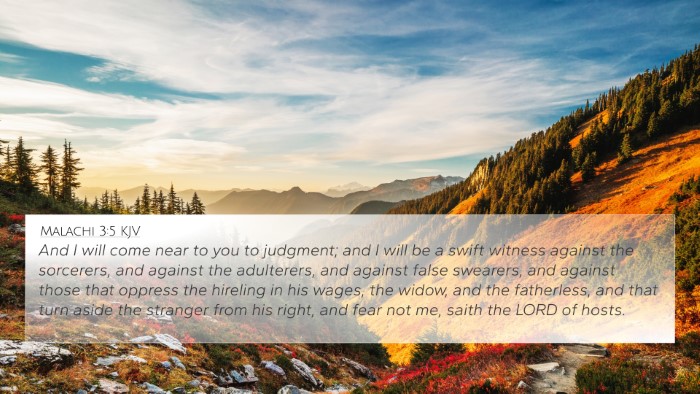
Malachi 3:5 (KJV) »
And I will come near to you to judgment; and I will be a swift witness against the sorcerers, and against the adulterers, and against false swearers, and against those that oppress the hireling in his wages, the widow, and the fatherless, and that turn aside the stranger from his right, and fear not me, saith the LORD of hosts.
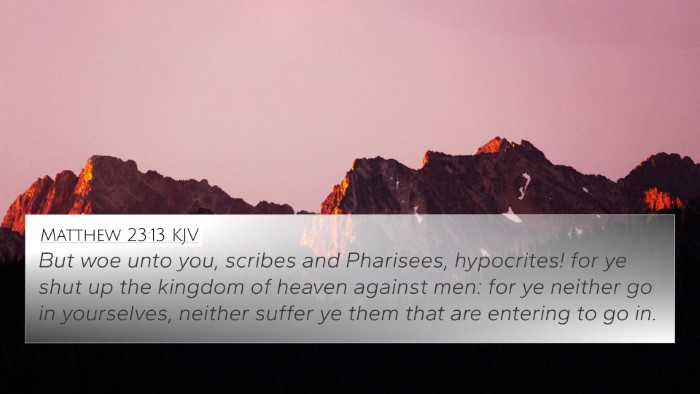
Matthew 23:13 (KJV) »
But woe unto you, scribes and Pharisees, hypocrites! for ye shut up the kingdom of heaven against men: for ye neither go in yourselves, neither suffer ye them that are entering to go in.
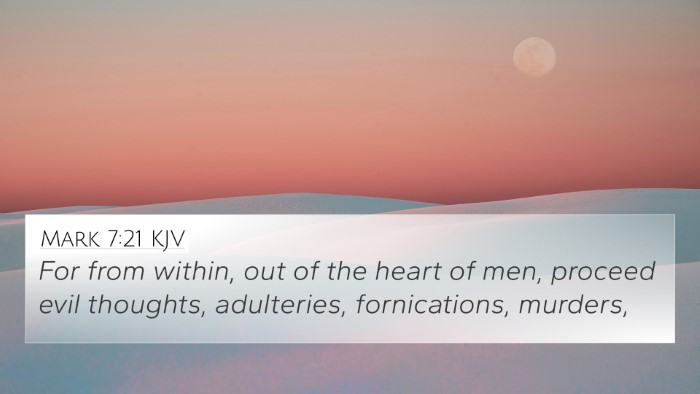
Mark 7:21 (KJV) »
For from within, out of the heart of men, proceed evil thoughts, adulteries, fornications, murders,
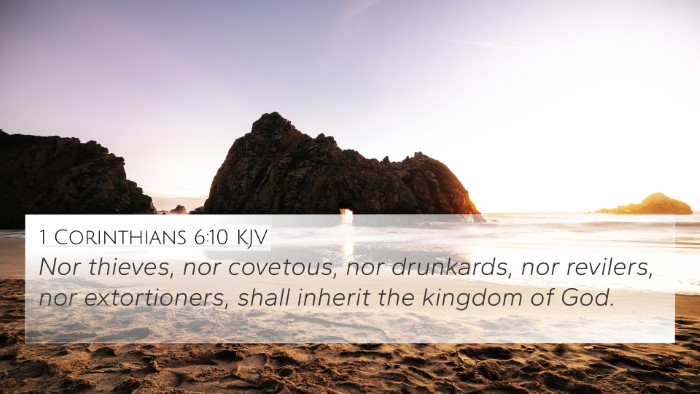
1 Corinthians 6:10 (KJV) »
Nor thieves, nor covetous, nor drunkards, nor revilers, nor extortioners, shall inherit the kingdom of God.
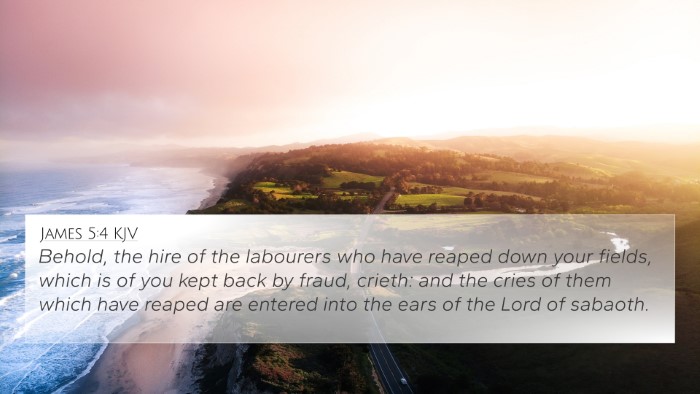
James 5:4 (KJV) »
Behold, the hire of the labourers who have reaped down your fields, which is of you kept back by fraud, crieth: and the cries of them which have reaped are entered into the ears of the Lord of sabaoth.
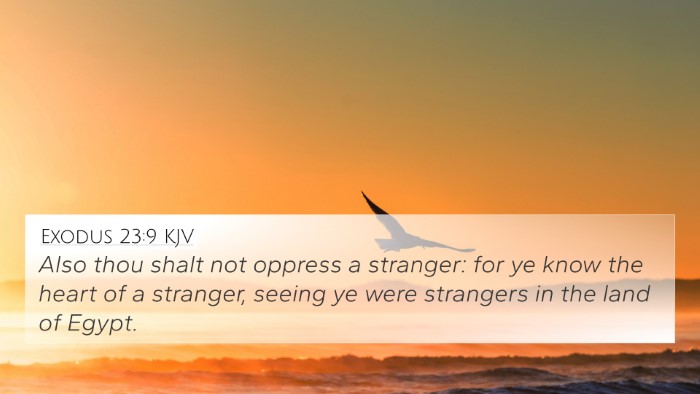
Exodus 23:9 (KJV) »
Also thou shalt not oppress a stranger: for ye know the heart of a stranger, seeing ye were strangers in the land of Egypt.
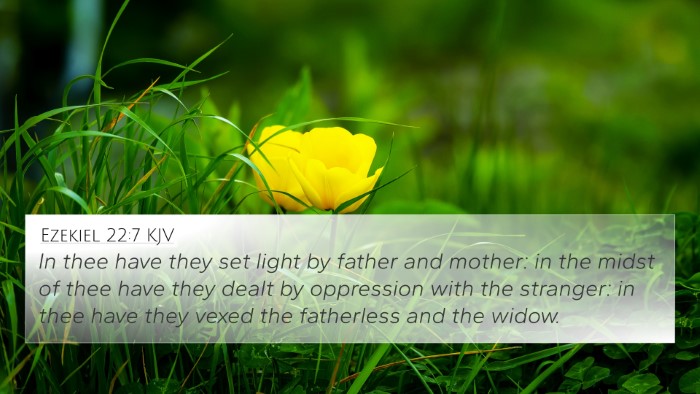
Ezekiel 22:7 (KJV) »
In thee have they set light by father and mother: in the midst of thee have they dealt by oppression with the stranger: in thee have they vexed the fatherless and the widow.
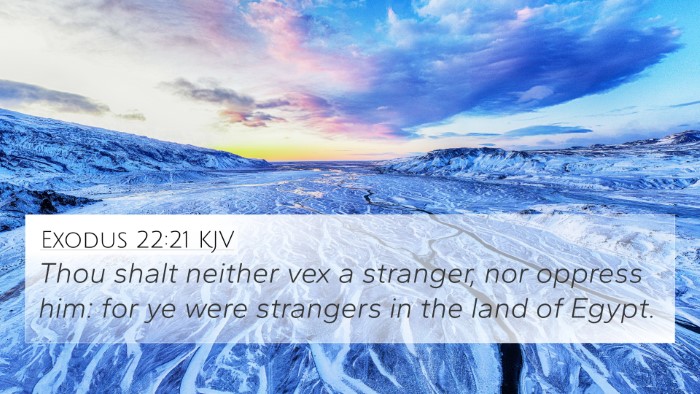
Exodus 22:21 (KJV) »
Thou shalt neither vex a stranger, nor oppress him: for ye were strangers in the land of Egypt.
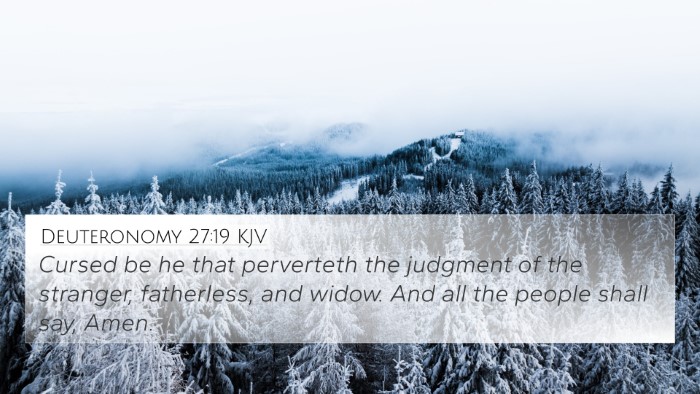
Deuteronomy 27:19 (KJV) »
Cursed be he that perverteth the judgment of the stranger, fatherless, and widow. And all the people shall say, Amen.
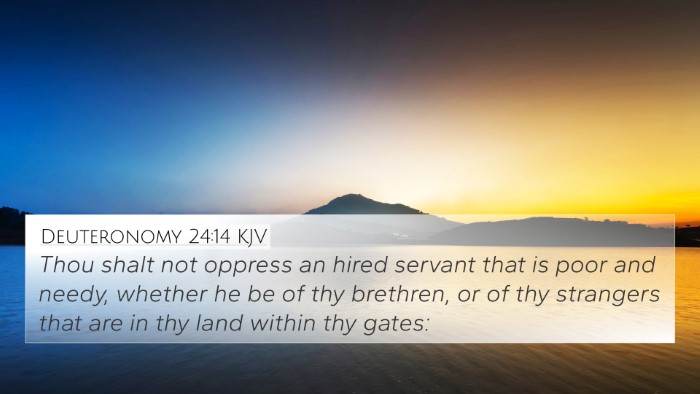
Deuteronomy 24:14 (KJV) »
Thou shalt not oppress an hired servant that is poor and needy, whether he be of thy brethren, or of thy strangers that are in thy land within thy gates:

Psalms 140:2 (KJV) »
Which imagine mischiefs in their heart; continually are they gathered together for war.
Zechariah 7:10 Verse Analysis and Similar Verses
Understanding Zechariah 7:10
Verse: "And oppress not the widow, nor the fatherless, the stranger, nor the poor; and let none of you imagine evil against his brother in your heart." (Zechariah 7:10)
Summary of Meaning: Zechariah 7:10 urges the people to act justly and compassionately towards vulnerable members of society. It serves as a reminder to avoid offensive actions or thoughts against others, promoting love and empathy. In examining this verse, we uncover important themes found throughout Scripture concerning justice, mercy, and interpersonal relationships.
Commentary Insights
- Matthew Henry: Henry emphasizes the moral responsibility of the community to support those who are weak and marginalized. He highlights that the command not to "oppose" anyone reflects God's character and His desire for justice.
- Albert Barnes: Barnes notes that this verse aligns with the overall theme of prophetic messages toward societal justice. He indicates that neglecting the needs of the vulnerable incurs God's displeasure and disregards His commandments regarding compassion.
- Adam Clarke: Clarke provides insight into the cultural context during Zechariah's time, recognizing the hardships faced by widows, orphans, and the poor. He stresses the importance of protecting their rights and advocating for equity and decency.
Bible Cross-References
Zechariah 7:10 connects with several other scripture passages that enrich its meaning:
- Deuteronomy 24:17-22: These verses emphasize the protection of the vulnerable, including widows and orphans.
- Isaiah 1:17: Calls for the defense of the oppressed and encourages doing good and seeking justice.
- James 1:27: Discusses pure religion as caring for orphans and widows, reinforcing the message of mercy and service.
- Matthew 25:40: Jesus taught that serving the least among us is akin to serving Him directly.
- Proverbs 14:31: Highlights that those who oppress the poor insult their Maker.
- Luke 6:31: Encourages treating others as one would like to be treated, which resonates with the essence of Zechariah's message.
- Micah 6:8: Calls believers to act justly, love mercy, and walk humbly with God.
Connections Between Bible Verses
The thematic connections in Zechariah 7:10 and the identified cross-references establish a clear biblical mandate for social justice and moral responsibility. By connecting these verses, we derive a broader understanding of God's expectations:
- Social Justice: The consistent theme across the referenced scriptures reminds believers that social justice is a divine commandment, urging followers to actively participate in uplifting the downtrodden.
- Community Responsibility: The call to care for one another illustrates the interconnectedness within the body of believers and the obligation to ensure that no one is left behind.
- Moral Integrity: The instruction to avoid imagining evil against one's brother fosters a spirit of love and unity, essential for a thriving community of faith.
Comparative Bible Verse Analysis
Examining Zechariah 7:10 in light of other verses enhances our grasp of its implications:
- Parallel to Old Testament Law: The verse echoes various commandments in the Pentateuch, emphasizing fidelity to God's law concerning mercy and ethical conduct.
- Reflections in the New Testament: Jesus’ teachings frequently echo the principles of love and compassion found in Zechariah, showcasing continuity in God’s message through His Word.
Tools for Bible Cross-Referencing
To facilitate a deeper understanding of thematic Bible verse connections, several resources and methods can be utilized:
- Bible Concordance: A tool that helps locate passages where particular words appear, which can aid in identifying related verses.
- Bible Cross-Reference Guide: Many Bibles now include annotations that draw connections between verses, helping readers find related scriptures easily.
- Bible Study Software: Programs and apps designed for in-depth study often include cross-referencing features that unveil relationships between texts.
- Commentaries: Utilizing respected commentaries can provide insights into paralleling themes across different passages.
Conclusion
In summary, Zechariah 7:10 serves as a crucial reminder of God's desire for justice and compassion. By understanding this verse in conjunction with other scriptural passages, believers can foster a deeper sense of community, responsibility, and moral integrity. The cross-references and the insights from public domain commentaries work together to confirm the timeless nature of God's commands and the importance of living a life characterized by love towards others.
